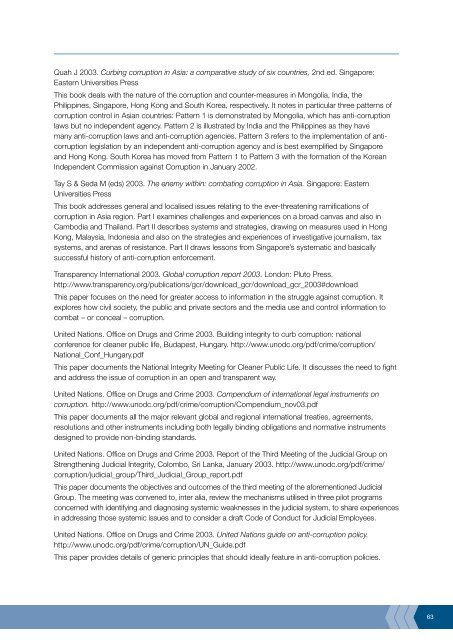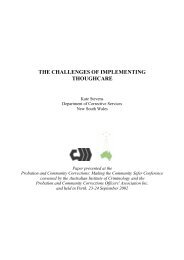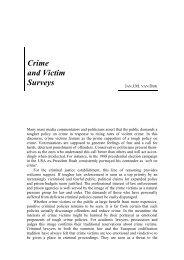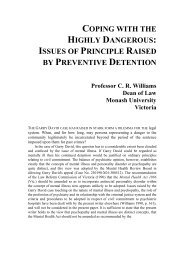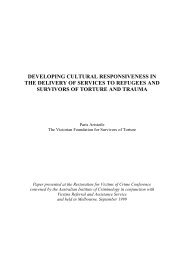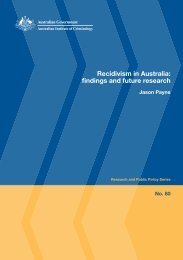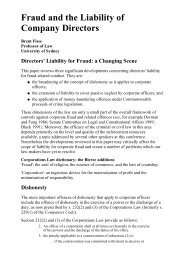Review of anti-corruption strategies Rob McCusker - Australian ...
Review of anti-corruption strategies Rob McCusker - Australian ...
Review of anti-corruption strategies Rob McCusker - Australian ...
You also want an ePaper? Increase the reach of your titles
YUMPU automatically turns print PDFs into web optimized ePapers that Google loves.
Quah J 2003. Curbing <strong>corruption</strong> in Asia: a comparative study <strong>of</strong> six countries, 2nd ed. Singapore:<br />
Eastern Universities Press<br />
This book deals with the nature <strong>of</strong> the <strong>corruption</strong> and counter-measures in Mongolia, India, the<br />
Philippines, Singapore, Hong Kong and South Korea, respectively. It notes in particular three patterns <strong>of</strong><br />
<strong>corruption</strong> control in Asian countries: Pattern 1 is demonstrated by Mongolia, which has <strong>anti</strong>-<strong>corruption</strong><br />
laws but no independent agency. Pattern 2 is illustrated by India and the Philippines as they have<br />
many <strong>anti</strong>-<strong>corruption</strong> laws and <strong>anti</strong>-<strong>corruption</strong> agencies. Pattern 3 refers to the implementation <strong>of</strong> <strong>anti</strong><strong>corruption</strong><br />
legislation by an independent <strong>anti</strong>-<strong>corruption</strong> agency and is best exemplified by Singapore<br />
and Hong Kong. South Korea has moved from Pattern 1 to Pattern 3 with the formation <strong>of</strong> the Korean<br />
Independent Commission against Corruption in January 2002.<br />
Tay S & Seda M (eds) 2003. The enemy within: combating <strong>corruption</strong> in Asia. Singapore: Eastern<br />
Universities Press<br />
This book addresses general and localised issues relating to the ever-threatening ramifications <strong>of</strong><br />
<strong>corruption</strong> in Asia region. Part I examines challenges and experiences on a broad canvas and also in<br />
Cambodia and Thailand. Part II describes systems and <strong>strategies</strong>, drawing on measures used in Hong<br />
Kong, Malaysia, Indonesia and also on the <strong>strategies</strong> and experiences <strong>of</strong> investigative journalism, tax<br />
systems, and arenas <strong>of</strong> resistance. Part II draws lessons from Singapore’s systematic and basically<br />
successful history <strong>of</strong> <strong>anti</strong>-<strong>corruption</strong> enforcement.<br />
Transparency International 2003. Global <strong>corruption</strong> report 2003. London: Pluto Press.<br />
http://www.transparency.org/publications/gcr/download_gcr/download_gcr_2003#download<br />
This paper focuses on the need for greater access to information in the struggle against <strong>corruption</strong>. It<br />
explores how civil society, the public and private sectors and the media use and control information to<br />
combat – or conceal – <strong>corruption</strong>.<br />
United Nations. Office on Drugs and Crime 2003. Building integrity to curb <strong>corruption</strong>: national<br />
conference for cleaner public life, Budapest, Hungary. http://www.unodc.org/pdf/crime/<strong>corruption</strong>/<br />
National_Conf_Hungary.pdf<br />
This paper documents the National Integrity Meeting for Cleaner Public Life. It discusses the need to fight<br />
and address the issue <strong>of</strong> <strong>corruption</strong> in an open and transparent way.<br />
United Nations. Office on Drugs and Crime 2003. Compendium <strong>of</strong> international legal instruments on<br />
<strong>corruption</strong>. http://www.unodc.org/pdf/crime/<strong>corruption</strong>/Compendium_nov03.pdf<br />
This paper documents all the major relevant global and regional international treaties, agreements,<br />
resolutions and other instruments including both legally binding obligations and normative instruments<br />
designed to provide non-binding standards.<br />
United Nations. Office on Drugs and Crime 2003. Report <strong>of</strong> the Third Meeting <strong>of</strong> the Judicial Group on<br />
Strengthening Judicial Integrity, Colombo, Sri Lanka, January 2003. http://www.unodc.org/pdf/crime/<br />
<strong>corruption</strong>/judicial_group/Third_Judicial_Group_report.pdf<br />
This paper documents the objectives and outcomes <strong>of</strong> the third meeting <strong>of</strong> the aforementioned Judicial<br />
Group. The meeting was convened to, inter alia, review the mechanisms utilised in three pilot programs<br />
concerned with identifying and diagnosing systemic weaknesses in the judicial system, to share experiences<br />
in addressing those systemic issues and to consider a draft Code <strong>of</strong> Conduct for Judicial Employees.<br />
United Nations. Office on Drugs and Crime 2003. United Nations guide on <strong>anti</strong>-<strong>corruption</strong> policy.<br />
http://www.unodc.org/pdf/crime/<strong>corruption</strong>/UN_Guide.pdf<br />
This paper provides details <strong>of</strong> generic principles that should ideally feature in <strong>anti</strong>-<strong>corruption</strong> policies.


